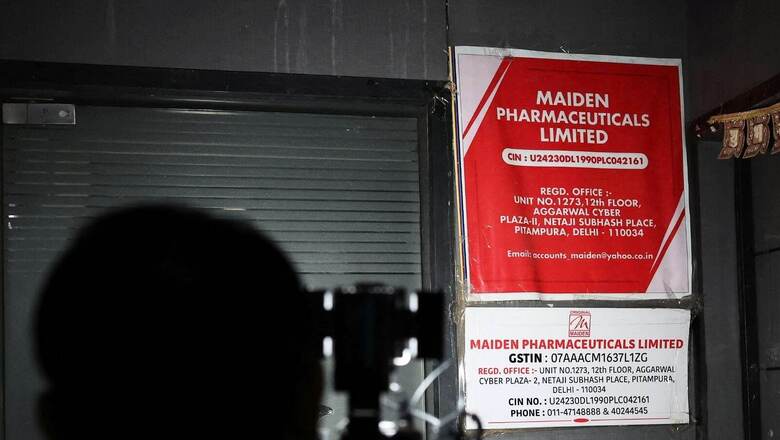
views
The World Health Organisation (WHO) on Wednesday issued an alert over four cough syrups manufactured by an Indian drugmaker, claiming that the deaths of 66 young children in Africa’s Gambia may be linked to contaminated cough and cold syrups.
According to WHO, laboratory analysis of the syrups confirmed “unacceptable” amounts of Diethylene Glycol and Ethylene Glycol, which can be toxic and lead to acute kidney injury.
It said medical officers in Gambia raised an alarm in July after dozens of children began falling ill with kidney ailments. The officers saw a pattern emerging where dozens of patients younger than five were falling sick three to five days after taking a locally sold syrup.
What is Diethylene Glycol?
Glycerol or glycerin is a colourless and odourless liquid that is generally safe for human consumption. It is used in the food, pharmaceutical and personal care industries as a sweetener or lubricant and helps maintain the moisture of products.
According to a study by American life sciences and research firm PerkinElmer, manufacturers — unethically — may contaminate glycerol to increase their profits and Diethylene Glycol (DEG) is the most common adulterant. “DEG has a number of properties similar to glycerol and is roughly three times cheaper.”
In the past, it has been used as an illegal adulterant in wine. “However, ingestion of DEG is toxic and thousands of reported cases of DEG poisoning have resulted in illness and fatalities worldwide.”
The current FDA safety limit for DEG in glycerol is 0.1 per cent by weight.
The controversial past of DEG
According to Science Direct, a website which provides access to a large bibliographic database of scientific and medical publications of Dutch publisher Elsevier, Diethylene Glycol is important in the history of adverse drug reactions.
In fact, the first major drug catastrophe in the history of public control of drugs occurred in 1937 in the United States and involved Diethylene Glycol.
“A pharmacist introduced a drug, Elixir Sulfanilamide, which consisted of Sulfanilamide dissolved in Diethylene Glycol. It had been tested for flavour, appearance, and fragrance, but not for safety,” the website said.
After taking the drug, the website claimed, over 100 patients died in severe pain. Many of these were children who were given Elixir Sulfanilamide for sore throat and cough.
The drug is known to cause renal (kidney) toxicity and also affects the central nervous system, heart, respiratory system, liver and pancreas.
Biochemical changes associated with toxicity include elevated liver enzyme levels as well as increased serum blood urea nitrogen and creatinine levels — all critical kidney parameters.
Earlier too, epidemics of Diethylene Glycol–induced acute kidney injury have been reported in India and Bangladesh, the website claimed. In one large study, 236 deaths were recorded among 339 children with unexplained acute kidney injury (AKI) in a children’s hospital in Dhaka, Bangladesh.
The Indian pharmaceutical market had a DEG poisoning problem since last many decades, with the first event being reported in 1972 in Madras. According to experts, such poisoning events happen because pharma companies do not test all excipients before they are used in manufacturing drugs, despite the Good Manufacturing Practice code requiring prior testing.
Twelve children died in Jammu due to DEG in 2020, 33 deaths were reported in Delhi in 1998, and 14 deaths in Mumbai in 1986.
What is Ethylene Glycol?
Ethylene Glycol is also a useful industrial compound found in many consumer products such as hydraulic brake fluids, stamp pad ink, ballpoint pens, solvents, paints, plastics, films, and cosmetics apart from drug manufacturing.
Ethylene Glycol has a sweet taste but if ingested, it breaks down into toxic compounds in the body.
According to America’s Centre for Disease Control and Prevention, “Ethylene Glycol and its toxic by-products first affect the central nervous system (CNS), then the heart, and finally the kidneys. Ingesting enough can cause death.”
The book ‘Imaging of the Brain’ says the incidence of Ethylene Glycol poisoning in the United States exceeds 5,000 per year and it is estimated that ingestion causes 40 to 60 deaths annually.
It claimed that poisonings occur most commonly in adults, but nearly a fourth of them occur in individuals younger than the age of 19 and more than 10 per cent is noticed in children younger than six.
Read all the Latest News India and Breaking News here




















Comments
0 comment